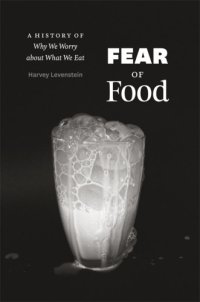
Ebook: Fear of Food: A History of Why We Worry About What We Eat
- Tags: Eating disorders--United States, Food preferences--United States, Food--United States--Psychological aspects, Nutrition--United States--Psychological aspects, Phobias--United States, Vitamins--Research--History, Diet--United States, Natural foods industry, Nutrition--Psychological aspects, Phobias, Vitamins--Research, Diet, Eating disorders, Food--Psychological aspects, Food preferences, History, Metchnikoff Elie -- 1845-1916, McCollum Elmer Verner -- 1879-1967, Keys Ancel -- 1904-2004, Food -- United States
- Year: 2013
- Publisher: The University of Chicago Press
- City: United States
- Language: English
- epub
Germophobia -- Milk: "The most valuable and dangerous food" -- Autointoxication and its discontents -- Bacteria and beef -- Lucrezia Borgias in the kitchen? -- Vitamania and its deficiencies -- "Hidden hunger" stalks the land -- Natural foods in Shangri-la -- Lipophobia -- Creating a national eating disorder.;There may be no greater source of anxiety for Americans today than the question of what to eat and drink. Are eggs the perfect protein, or are they cholesterol bombs? Is red wine good for my heart or bad for my liver? Will pesticides, additives, and processed foods kill me? Here with some advice is food historian Harvey Levenstein. He reveals the people and interests who have created and exploited these worries, causing an extraordinary number of Americans to allow fear to trump pleasure in dictating their food choices. He tells of the prominent scientists who first warned about deadly germs and poisons in foods and their successors who charged that processing foods robs them of life-giving vitamins and minerals. These include Nobel Prize-winner Elie Metchnikoff, who advised that yogurt would enable people to live to be 140, and Elmer McCollum, the "discoverer" of vitamins, who tailored his warnings about vitamin deficiencies to suit the food producers who funded him. Levenstein also highlights how large food companies have taken advantage of these concerns by marketing their products to combat the fear of the moment. Such examples include the co-opting of the "natural foods" movement, which grew out of the belief that inhabitants of a remote Himalayan Shangri-la enjoyed remarkable health by avoiding the very kinds of processed food these corporations produced, and the physiologist Ancel Keys, originator of the Mediterranean Diet, who provided the basis for a powerful coalition of scientists, doctors, food producers, and others to convince Americans that high-fat foods were deadly. In "Fear of Food", Levenstein offers a much-needed voice of reason; he questions these stories of constantly changing advice to reveal that there are no hard-and-fast facts when it comes to eating. With this book, he hopes to free us from the fears that cloud so many of our food choices and allow us to finally rediscover the joys of eating something just because it tastes good.
Download the book Fear of Food: A History of Why We Worry About What We Eat for free or read online
Continue reading on any device:

Last viewed books
Related books
{related-news}
Comments (0)